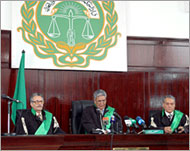Libya Aids evidence ‘worthless’
A British science journal has said that the evidence against six foreign health workers, accused in Libya of deliberately infecting more than 400 children with the Aids virus, is worthless.

In a news report on Thursday, Nature, one of the world’s most prestigious science publications, said that it had acquired a copy of a document written by five Libyan physicians in 2003 that is the cornerstone of the case against the five Bulgarian nurses and a Palestinian doctor.
The journal had the document translated into English and asked independent experts to assess it.
Consensus
All agreed that its accusations were unsupported by fact and riddled with suppositions, the weekly said.
Janine Jagger, an expert in blood-borne pathogens who heads the International Health Care Worker Safety Centre at the University of Virginia at Charlottesville, was quoted as saying: “I don’t see any evidence in it.
|
“If the accused are found guilty, it will be a travesty of justice” |
“It wouldn’t meet the lowest standards of epidemiological evidence for establishing any causal relationship.”
Robin Weiss, an Aids virologist at University College London, said: “There are no grounds for suspicion of deliberate infection by any staff, and strong evidence of hospital-acquired infection before the arrival and after the departure of the foreign health workers.
“If the accused are found guilty, it will be a travesty of justice.
“Moreover, it would be foolhardy for any expatriate healthcare workers, whether from the Arab world or elsewhere, to work in Libya.”
Criticism
The experts were also critical that the Libyan court had dismissed a report written by Luc Montagnier, who co-discovered the human immunodeficiency virus (HIV), which causes Aids, and by Vittorio Colizzi, an Aids researcher at Tor Vergata University in Rome.
That report had concluded that the infections began in 1997, before the medics had arrived in Libya, and were caused accidentally by reused and unsterilised needles at the Benghazi hospital.
 |
|
The High Court is still to decide on |
The evidence for this was that many of the children were also infected with hepatitis B and C and that two nurses at the hospital were infected with the same HIV strain as the children themselves, the Montagnier-Colizzi report said.
In addition, the virus responsible was of the A/G subtype of HIV-1, a recombinant strain common in Central and West Africa, and not a genetically modified strain as the Libyan prosecutors had alleged, it said.
The report by Nature adds to a swelling international outcry about the case, which resumes in a retrial next Tuesday.
The six could be sentenced to death if found guilty. A group of US, Canadian and European experts, including Robert Gallo, the other discoverer of the Aids virus, made a joint appeal in the US journal Science this week.
They said confessions signed by two of the accused were made under torture, criticised the court for excluding independent expert testimony and called on their governments to pressure Libya to release the six.
The defendants are accused of infecting 426 children. Fifty-two of them have died.